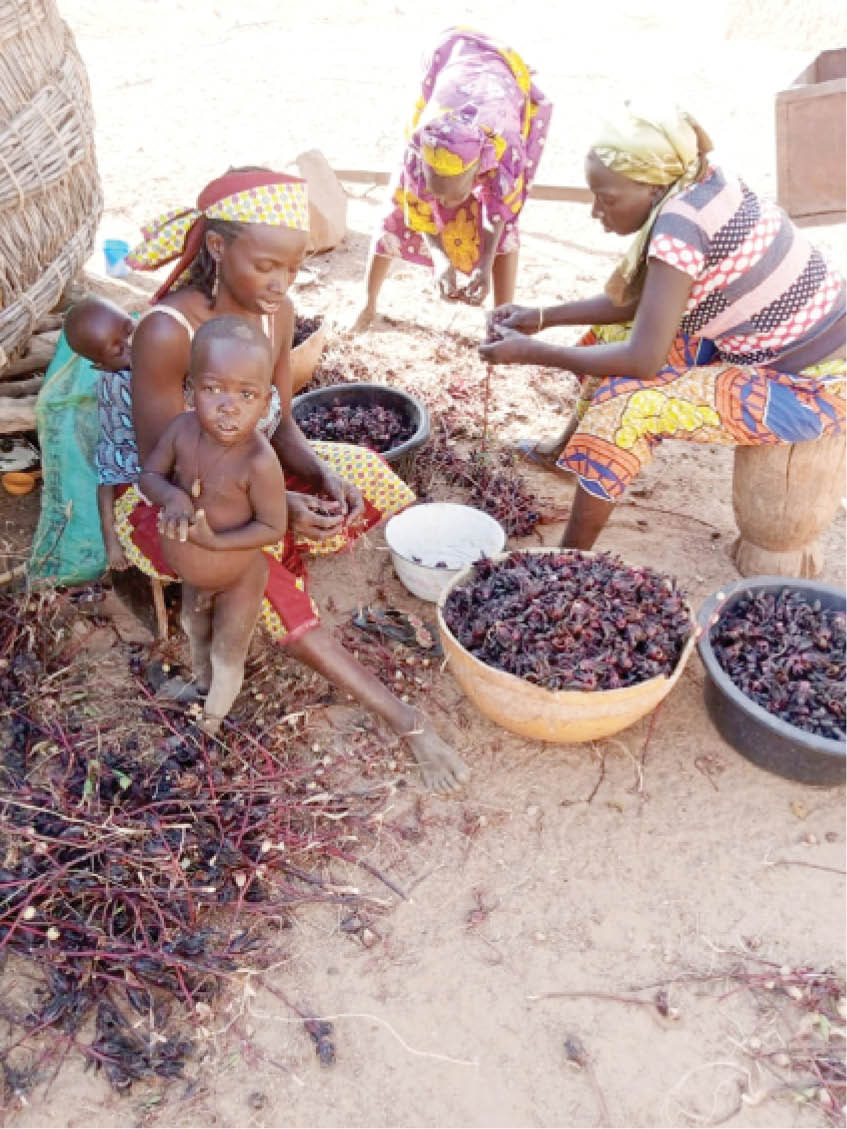Hibiscus roselle (zobo) farmers in Katsina State have recorded a decline in production despite fair rainfall this year.
The farmers said the poor harvest was as a result of the absence of affordable fertiliser from the beginning of the rainy season, and the invasion of their farms by herdsmen from Niger Republic.
- Why catfish farming is not booming in Nigeria – Obasanjo
- Lekki shootings: Army rejects Lagos panel’s summons for General, Colonel
They also lamented that the continued relocation of some of their markets and lack of government support were part of their major challenges this year.
They observed that the heavy rainfall recorded towards the end of the season did not favour the roselle plant to grow up to its usual height, which would have enabled it to produce good seeds that would eventually produce the blossom red seed coat or cover, popularly known as zobo.

Malam Abdullahi Kwangwama, a zobo farmer in Mani Local Government Area of the state, in an interview with Daily Trust, disclosed that from the beginning of last season there was no manure or fertiliser to apply to the plant, a situation that slowed down its growth.
Malam Kwangwama said, “We did not get any fertiliser from the government throughout the season, and that made it difficult for the plant to grow early. The few bags we were able to buy from the market at N12,000 per bag came late, and it couldn’t help it to grow up to the height of my chest, which is its normal height; therefore, it couldn’t produce much seeds.
“I did not plant much food crops this year. And I am only able to harvest 60 bags of hibiscus this season, as against 85 bags I got last year. I have two wives and eight children; six of them are in school, and this is my only hope of feeding them and paying their school fees.
“If government wants to support us to produce zobo in commercial quantity for domestic use in Nigeria and export, all they need to do is make adequate plans for the provision of fertiliser at cheaper prices and support farmers to access non-interest loans that can enable us hire and cultivate more farmlands. This is because buyers are always waiting for the produce, and we are ready to do more as well.”
The roselle seed coat or cover is used in producing the popular zobo juice in Nigeria, which is considered useful in the treatment of stomach upset, high blood pressure, weight loss, among others. In some countries, it is used in tea production, colouring, dyeing, drug production and cosmetics.
Another farmer and merchant of zobo, Ali Makeri, complained that one of the challenges they were facing was the relocation of the market by the authorities of Mashi Local Government Area, which he said was affecting patronage.
According to him, the market has been relocated severally to various places, which are far away from the Mashi main market.
He further said, “Even though we pay revenue to the local government and create jobs, for over five times they have been relocating us from one bushy area to another. Once they discovered that we had settled and developed a particular place, they would come overnight and take us to another isolated area. The last one was this year when they brought us here, close to the Mashi Ultra-Modern Market.
“It is far away from the main market and our customers are scared to come here, for security purposes. Therefore, we are appealing to the chairman to reason with us and allocate a permanent and convenient place close to the main market because most of our customers come from different parts of the country; and they will be comfortable if we are close to the main market.”
On whether zobo farmers in Katsina State have the capacity to produce large quantities for export, Makeri said, “Why not? There are hundreds of men and women hibiscus farmers in Katsina State because it is lucrative. Last year alone, we sold it at N8,000 per bag from the beginning, and at some point, it reached N20,000 per bag.
All we need is support. If government can attract investors here and build a factory that can supply us with fertiliser, equipment and loans to hire more lands, I can assure you that we will generate more revenue for Nigeria.”
Another farmer, Malam Yusuf Gwani Gobirawa in Kaita Local Government Area complained that herdsmen from neighbouring Niger Republic invaded their farms before they could finish harvesting this year.
He said, “Our hibiscus did not ripe very well when we noticed that herdsmen from Niger Republic arrived and started pushing their animals into our farms. However, the member representing us in the House of Assembly intervened through traditional rulers and we were asked to quickly harvest anything remaining in our farms in order to avoid clashes with the herdsmen. I got only 45 bags as against the 70 to 80 I expected this year.
Our borders are porous. Government needs to check the activities of these herdsmen from Niger Republic by closing the border, especially when it comes towards the end of seasons so that we can peacefully harvest our farm produce.
You know we largely depend on local manure from our domestic cattle. But now, we cannot keep our animals away from home. Even at home, we are having sleepless nights to protect them from being stolen. We are really helpless in the hands of the rustlers.”
Zobo is sold in Dankama, Mashi and Mai’adua markets in the state. The current market price is between N7,500 and N8,000 per bag. It is expected to reach N20,000 before the beginning of next season.
The major producers of the crop in Nigeria are Katsina, Kano, Bauchi, Borno, Gombe and Jigawa states. In 2017 the Nigerian Agricultural Quarantine Service (NAQS) disclosed that the country generated $35million within nine months in 2017 from zobo export.

 Join Daily Trust WhatsApp Community For Quick Access To News and Happenings Around You.
Join Daily Trust WhatsApp Community For Quick Access To News and Happenings Around You.


